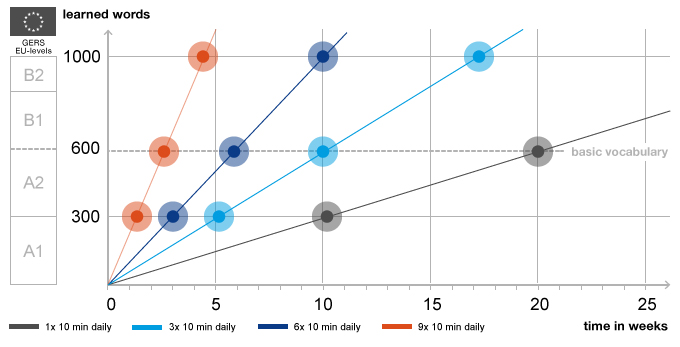There are a lot of long-term benefits that come with learning a new language. Multilingualism can be useful in one’s career, a forthcoming vacation, a semester abroad, or new love. For all these reasons, timing is essential. Many people want to learn as quickly as possible.
How Long Does It Take to Learn a New Language?
Different factors influence the speed of learning:
- What languages do you currently speak? Is the new language like a language you know? For example: if you know Italian, you can learn Spanish in no time.
- What is your reason for learning a new language? Is there a deadline motivating you?
- What do you strive for? Would you like to learn the basics or of conversation business?
- How do you prefer to learn? Learning a new language amongst native speakers is the easiest method since you experience constant exposure.
Cramming vocab and reviewing grammar rules is the hardest and slowest method. You don’t learn the nuances, your brain is not able to create the necessary connections and you will not have the best opportunity to speak the language fluently. Sorry, guys. It’s all about brain-friendly, intuitive learning. This way, you will keep the knowledge forever.
10-Minute Exercises for Faster Language Learning
Your brain is only able to focus for a limited time – less than an hour at a time. After a few minutes, your concentration decreases. Neuroscientists and learning experts such as Vera F. Birkenbihl found out that 10 minutes is the optimal amount of time to spend on a single topic. After 10 minutes, you should change the subject, exercise, or activity. This way, your brain stays focused and motivated.
Furthermore, the human brain keeps processing information for seven minutes after each study session subconsciously. While you are already focusing on other things, your brain processes rethink and saves any information that you’ve learned or heard minutes before.
If you divide your activities into 10-minute-periods, you can double retention.
How Many 10-Minute Units a Day?
The more you practice, the better the results. Specifically, the more 10-minute units you do throughout the day, the faster you will reach your goal. Doing 8-15 units a day is like an intensive course – you will learn the basics of any language in two weeks.
Here is an example of how to estimate the time needed to achieve your learning goals. If you practice 10 to 30 minutes a day (1-3 units of 10 minutes), you will learn:

A1 · 300 unique words · in 10 weeks
You can follow an easy, everyday conversation. Perfect if you’re preparing for a vacation.
A2 · 600 unique words · in 20 weeks
This is the basic vocabulary used in most languages. Many daily newspapers get by with 550-600 unique words. You will be able to understand most of the daily interactions.
B2 · 1000 unique words · in 30 weeks
90% of all text is made up of around 1,000 unique words. The rest is a literary language or technical vocabulary, which even native speakers rarely know or master.
One more thing: Make use of a brain-friendly learning method! Only with this method will your time exposure pay off!
→ SEE THE BRAIN-FRIENDLY LANGUAGE COURSES
